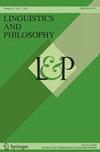真实性、时事性和透明度:单成分语义与双成分语义
IF 1.3
1区 文学
0 LANGUAGE & LINGUISTICS
引用次数: 0
摘要
什么时候两个句子说的是同一件事,即表达的是相同的内容?我们为双成分(2C)语义学辩护:命题内容(至少)由两个不可还原的不同成分组成:(1) 真理条件和 (2) 主题。我们将 2C 与单成分(1C)语义学进行对比,重点关注主体内容可还原为真值条件的观点。我们确定了这一观点的支持者,并论证了 2C 观点。附录中提出了命题 2C 语义的一般形式模板。本文章由计算机程序翻译,如有差异,请以英文原文为准。

Truth, topicality, and transparency: one-component versus two-component semantics
When do two sentences say the same thing, that is, express the same content? We defend two-component (2C) semantics: the view that propositional contents comprise (at least) two irreducibly distinct constituents: (1) truth-conditions and (2) subject-matter. We contrast 2C with one-component (1C) semantics, focusing on the view that subject-matter is reducible to truth-conditions. We identify exponents of this view and argue in favor of 2C. An appendix proposes a general formal template for propositional 2C semantics.
求助全文
通过发布文献求助,成功后即可免费获取论文全文。
去求助
来源期刊

Linguistics and Philosophy
Multiple-
CiteScore
2.60
自引率
9.10%
发文量
26
期刊介绍:
Linguistics and Philosophy focuses on issues related to structure and meaning in natural language, as addressed in the semantics, philosophy of language, pragmatics and related disciplines, in particular the following areas: philosophical theories of meaning and truth, reference, description, entailment, presupposition, implicatures, context-dependence, and speech actslinguistic theories of semantic interpretation in relation to syntactic structure and prosody, of discourse structure, lexcial semantics and semantic changepsycholinguistic theories of semantic interpretation and issues of the processing and acquisition of natural language, and the relation of semantic interpretation to other cognitive facultiesmathematical and logical properties of natural language and general aspects of computational linguisticsphilosophical questions raised by linguistics as a science: linguistics methodology, properties of linguistic theories and frameworks, and the relation of linguistics to other fields of inquiryContributions may be in the form of articles, replies, or review articles. Linguistics and Philosophy is indexed in the ISI/Social Science Citation Index.
 求助内容:
求助内容: 应助结果提醒方式:
应助结果提醒方式:


